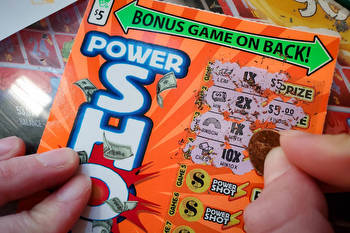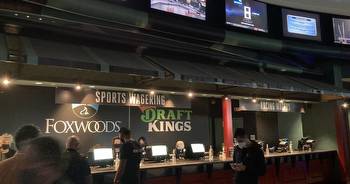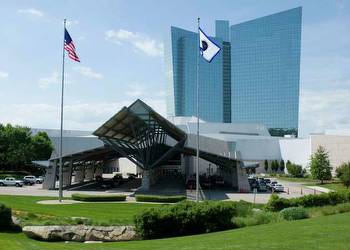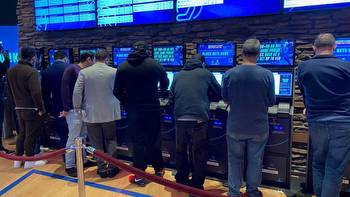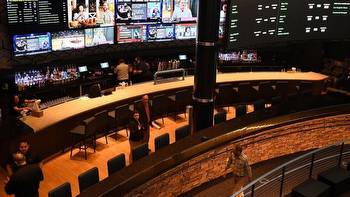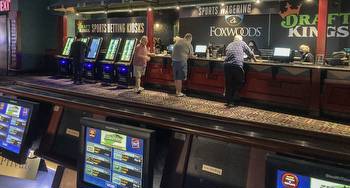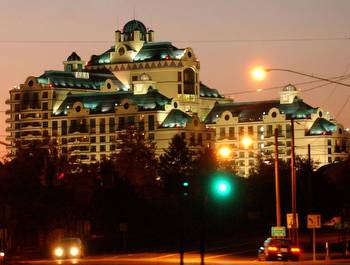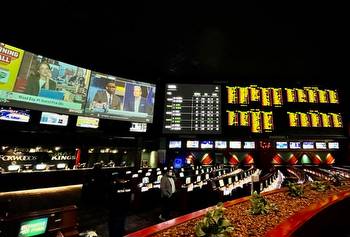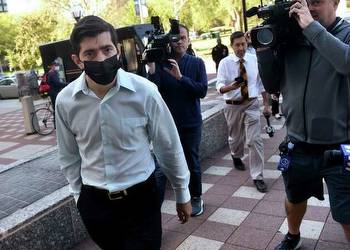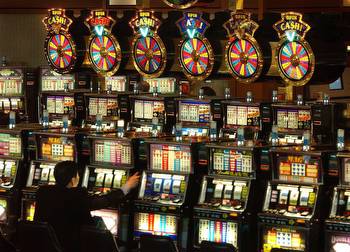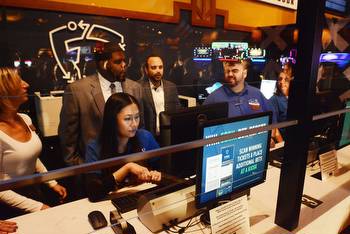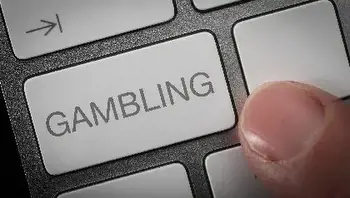CT tracks online gambling closely

Connecticut’s problem-gambling hotline is busiest on Mondays, the day after America’s holy day of televised NFL football, when ubiquitous ads offer “free play” and “risk-free” bets.
Compared to November 2020, hotline calls were up 87% in November 2021, the first full month after Connecticut flipped the switch on online gambling and made every smartphone a portal to two casinos and three sports books for anyone 21 and older.
“The new thing is people saying, ‘I just lost everything yesterday, because it was Football Sunday,’” said Diana Goode, executive director of the hotline’s operator, the Connecticut Council on Problem Gambling.
Goode said she took two such calls on the same Monday last month. Both came from young men, the dominant demographic of the fantasy sports games that preceded the legalization of sports betting. It is the cohort that some studies identify as most susceptible to gambling addiction, especially on sports.
The most memorable hotline call was handled by a colleague, Goode said. It came from a panicked college kid. His parents had logged into his bank account and found it inexplicably empty. Must be fraud, he told them. They were headed to the bank to find out.
“Now what do I do? It’s not bank fraud. I lied to my parents. I lost all my money sports betting,” he said, according to Goode. “Now what do I do?”
It’s a question some legislators are asking themselves.
Three months into the new era of convenience gambling, Connecticut has crude tools to measure problem gambling: The jump in hotline calls is a red flag, one not yet reflected in the number of patients in addiction treatment. The reams of data collected on the habits of these new online gamblers could be far more enlightening, but it is seen only by the casinos and sports books, not the state.
One thing the state does measure precisely is the money being gambled.
In less than three months of online gambling, Connecticut gamblers have wagered $2.6 billion. They bet $325 million on sports and $2.3 billion on digital casino games since the soft launch in early October through Dec. 31. After paying off the winners, the sports books kept $21.5 million and the online casinos $36.8 million.
From those gross gaming revenues, the state collected its cut of nearly $10 million — $2.96 million from sports betting, $6.57 million from digital casino games.
None of it has gone to the Connecticut Council on Problem Gambling — but it should, Goode said.
The council’s annual budget is $750,000, primarily funded by voluntary contributions from the two tribal casinos, CT Lottery and the state Department of Mental Health and Addiction Services. Goode said it cannot afford to add staff or even think about trying to counter the ad blitz under way from FanDuel and DraftKings, the two highest-grossing sports books in the United States.
“Let’s make it a little bit more of a fair fight,” Goode said. “I mean, I can watch TV for 15 minutes, and everybody’s advertising except us. I think I drive 1.6 miles to Hartford and probably see 10 billboards. And none of them are mine.”
The legislature’s Public Safety and Security Committee, which has jurisdiction over gambling legislation, is holding an invitation-only informational hearing at 1 p.m. Monday, Jan. 24, a first step at assessing the biggest expansion of gambling since two tribal casinos, Foxwoods Resort and Mohegan Sun, opened in the 1990s.
Foxwoods, Mohegan and the CT Lottery are now licensed to take bets on sports in person and online, each with a partner: Foxwoods with DraftKings, Mohegan with FanDuel, and the lottery with Rush Street, whose sports book is branded as PlaySugarHouse. The casinos also, for the first time, can offer virtual versions of their table games and slots. The online gambling is geofenced, blocked from digital devices outside Connecticut.
The new revenue is significant but a relatively small portion of the gambling dollars collected annually by the state: $542.7 million in 2020, down from $627.5 million in 2019, the year before COVID-19 depressed casino attendance. The biggest money-maker for Connecticut is the CT Lottery, which deposited $348 million in state coffers in 2020, compared to $193 million from the slots at Mohegan and Foxwoods.
State Rep. Maria Horn, D-Salisbury, and Sen. Cathy Osten, D-Sprague, co-chairs of the committee, said the agenda Monday will cover problem gambling, among other issues. Testimony will come from the casinos, the lottery and their partners, as well as the problem-gambling council and the Department of Consumer Protection.
Problem gambling has become personal for the committee. One of its members was former state Rep. Mike DiMassa, D-West Haven, who resigned last fall after his arrest on federal wire fraud charges. In court, he claimed a gambling addiction. As a condition of his bail, he is banned from the online gambling he advocated as a lawmaker.
Online gambling went live just four months after the General Assembly legalized it and two months after the adoption of gambling regulations under an abbreviated emergency process without public input.
In addition to the taxes paid monthly to the state, the two casinos each are required by the new law to provide $500,000 annually for the prevention and treatment of problem gambling. The CT Lottery must pay $1 million.
Goode assumed that a significant portion of that money would go to the council and at least some would be available not long after the launch of sports betting and online casino gambling. She was wrong on both counts.
The law is clear regarding the cash flow to the state: All three sports books and the two casinos must report revenues and pay taxes monthly. But it is silent on when the problem-gambling money must be paid and vague as to who is eligible to receive it.
Both tribes say they intend to maintain their support of the council. Last year, Mohegan Sun contributed $23,000 a month; Foxwoods, $18,000.
Mohegan Sun plans to direct a portion of its required annual contribution of $500,000 to academic research on a new treatment approach, said Chuck Bunnell, the Mohegan tribe’s chief of staff. The tribe has been supporting research, treatment and outreach for problem gambling for decades and will continue to do so, he said.
Other than committing support to the council with “a similar amount to prior years,” Foxwoods has not settled on recipients, said Rodney Butler, chairman of the Mashantucket Pequots, the casino’s tribal owner. The tribe, he said, is “evaluating other problem gaming programs in the state, as required by the legislation.”
(In the first year, theatrical casinos actually will owe less, as the money is prorated to reflect that the new gambling did not begin until the fourth month of the fiscal year.)
Horn said the casinos will be pressed for details.
“One of the things that we will be looking at is where the money is going. What are the needs? What should the balance of funds look like? Are there deficits there that we should be aware of? How we might fill those deficits? Those are all open questions,” Horn said.
Osten, who also is the co-chair of the Appropriations Committee and represents a district home to both casinos, said the state might need to provide immediate funding for prevention and treatment from the taxes it is collecting, 13.75% on the online sports books and 18% on online casino games. The latter rate goes to 20% in 2026.
The goal in June was to place in a law a firm number of what the casinos and Lottery must contribute to combat problem gambling, but she was aware of no negotiation involving lawmakers or the administration of Gov. Ned Lamont regarding a specific level of support for the council, Osten said.
The law and regulations require some of the safeguards recommended by the National Council on Problem Gambling in 2018, when the Supreme Court struck down a federal law that had barred sports betting outside Nevada, where sports books preceded the federal ban.
Connecticut activated an online voluntary self-exclusion list in September, and 336 people have signed up to bar themselves from betting for a year, five years or life, according to the Department of Consumer Protection, which regulates gaming.
Online gamblers must be notified when their lifetime spending exceeds $2,500, and they cannot continue gambling until acknowledging reaching that milestone and that they have the option to set “responsible gaming limits or close their account.”
How often does that happen?
Among the national recommendations unheeded in Connecticut was that any state expanding gambling should first think about how it will monitor the social and psychological impacts of convenience gambling, not just its revenues.
DraftKings will get you to Foxwoods slots and table games on your phone. FanDuel will do the same for Mohegan Sun.
Digital commerce of any kind yields deep veins of data. DraftKings and FanDuel know the demographics and habits of Connecticut’s new gambling class: Gender, age, hometown, frequency and amounts of betting, and time spent online at the virtual gaming tables.
Connecticut does not collect that data, which the National Council on Problem Gambling says should be publicly provided in an anonymous form.
Phil Sherwood, the communications director of the Massachusetts Council on Gaming and Health, said he is aware of no state that has fully implemented the national group’s recommendation on data collection.
States get into gambling with a focus on revenue, not consumer protection or health, Sherwood said.
His council is urging Bay State lawmakers, who are expected to legalize sports betting, to require data sharing — one of the safeguards it recommends if gambling is expanded beyond its three casinos.
The Connecticut Council on Problem Gambling is left to rely on limited data to gauge problems: Hotline calls and online chat contacts. Monthly visits to the chat page jumped from 152 in November 2020 to 3,578 in November 2021. Calls and texts in those same months went from 311 to 583, an 87% increase.
There has been no similar jump in gamblers seeking outpatient help from one of the 16 Bettor Choice treatment programs funded by the Department of Mental Health and Addiction Services. Monthly caseloads averaged 182 over the last six months of 2021, ranging from 173 in July to 183 in December, according to DMHAS.
Horn said her committee is trying to assess the current state of play, as well as to begin framing what data needs to be collected — the task the national council says should have been done first.
Connecticut’s last study on the impact of gambling was done in 2008.
“Last year, the focus was on getting the expansion of gaming over the line. And so, we can all second-guess what order we need to do things,” she said. “But I think with all those moving pieces, we now need to create a baseline that has some relevance for this new world we’re in. And that also will be a subject that I will be interested in at this hearing.”
- In Connecticut, Call (888) 789-7777 or Text “CTGAMB” to 53342
- New England Gamblers Anonymous Hotline Numbers:
(888) 830-2217 – Hotline for all New England States; (718) 352-1671 – Gam-Anon for Family and Friends Support; (855) 222-5542 – Gambler’s Anonymous International Hotline









